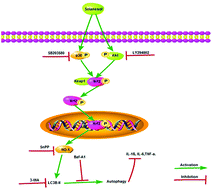The aim of the present study was to examine the anti-inflammatory effect of solanesol and to elucidate the underlying mechanisms. Heme oxygenase-1 (HO-1) plays an important role in cytoprotection against oxidative stress and inflammation. Solanesol induced HO-1 expression both at the level of mRNA and proteins, resulting in increased HO-1 activity. Solanesol treatment enhanced the level of the phosphorylated form, nuclear translocation, ARE-binding, and transcriptional activity of Nrf2. p38 and Akt contributed to ARE-driven HO-1 expression. Solanesol activated both p38 and Akt, and treatments with SB203580 (a p38 kinase inhibitor), LY294002 (an Akt inhibitor), specific p38 siRNA and Akt siRNA suppressed the solanesol-induced activation of Nrf2, resulting in a decrease in HO-1 expression. Solanesol also elevated the autophagic protein LC3B-II level. SnPP (a HO-1 inhibitor) and HO-1 siRNA markedly abolished the anti-inflammatory effect of solanesol against LPS-induced cell damage. Likewise, SB203580, LY294002, 3-MA and Baf-A1 inhibited the solanesol-induced anti-inflammatory effect. These studies demonstrate that solanesol attenuates inflammation by HO-1 induction via p38 and Akt signaling. Thus, it is quite plausible that HO-1 induction by solanesol could trigger anti-inflammatory pathways including limiting LPS-stimulated cytokine production through autophagic signaling via p38 and Akt.

